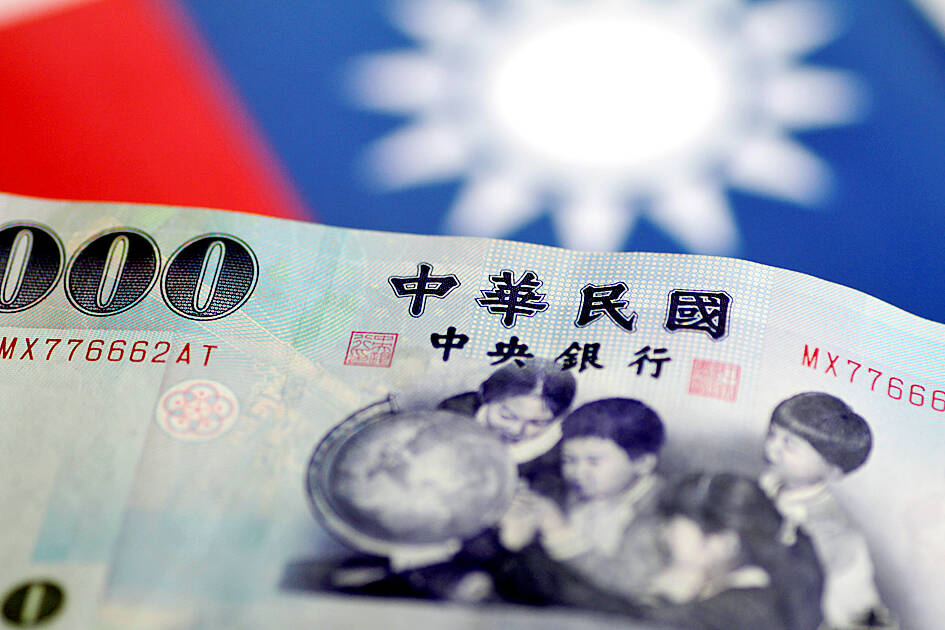The New Taiwan dollar’s recent weakness and the resulting return of carry trades are quickly driving down local life insurers’ hedging costs.
Three-month dollar hedging costs using NT dollar’s offshore forwards — derived from the differential in the US overnight-indexed swaps and NT dollar implied yield — have dropped to just 3 percent for the Taiwanese insurers, from as high as 14 percent three months ago, according to Bloomberg calculations.
This decline benefits insurers seeking protection against abrupt currency swings, and is largely driven by the NT dollar’s underperformance this quarter and its increased use as a funding currency in carry trades.

Photo: Reuters
“The drop in hedging costs is driven by the increased positioning back to longing the greenback against the Taiwan dollar, after the extreme levels seen in June and May,” BNY Mellon Corp strategist Wee Khoon Chong (張偉勤) said. “The Taiwan dollar’s weakness against the [US] dollar past the 30 level was a surprise to many, hence driving investors to cover those bets.”
Taiwanese insurance companies have more than 90 percent of their overseas assets denominated in the greenback. Declines in the US currency might leave them exposed to billions of US dollars in foreign exchange losses, as happened in May, when the local dollar surged the most in a day since 1988. BNP Paribas SA expects Taiwan’s insurers to increase hedges in the latter part of the fourth quarter due to seasonality.
Carry trades, in which investors borrow in low-interest-rate currencies to invest in assets from higher-interest-rate regimes, have also contributed to the decline in hedging costs.
“Since volatility is decreasing globally, investors are trying to add carry to their portfolios,” BNP Paribas strategist Chandresh Jain said. “They are taking long positions in high-yielding currencies from around the world” and using the NT dollar as a funding currency.
While the drop in costs presents a chance for Taiwan’s insurers to increase their hedge ratios, market flows and commentary suggest they have yet to take much advantage.
Fubon Life Insurance Co (富邦人壽), for example, said it would use non-deliverable forwards as a short-term hedging tool “tactically and flexibly” when it sees room for NT dollar appreciation, while continuing to build a reserve fund to absorb foreign exchange losses.
Strategists still expect the NT dollar to strengthen against the greenback, as the US Federal Reserve moves to cut interest rates and Taiwan’s economic fundamentals remain strong.
“Not hedging in a weakening dollar environment might be detrimental for the insurers’ earnings,” given the positive outlook for local stocks and the local currency that is supported by Taiwan’s economic strength, Chong said.

On Tuesday, US President Donald Trump weighed in on a pressing national issue: The rebranding of a restaurant chain. Last week, Cracker Barrel, a Tennessee company whose nationwide locations lean heavily on a cozy, old-timey aesthetic — “rocking chairs on the porch, a warm fire in the hearth, peg games on the table” — announced it was updating its logo. Uncle Herschel, the man who once appeared next to the letters with a barrel, was gone. It sparked ire on the right, with Donald Trump Jr leading a charge against the rebranding: “WTF is wrong with Cracker Barrel?!” Later, Trump Sr weighed

HEADWINDS: Upfront investment is unavoidable in the merger, but cost savings would materialize over time, TS Financial Holding Co president Welch Lin said TS Financial Holding Co (台新新光金控) said it would take about two years before the benefits of its merger with Shin Kong Financial Holding Co (新光金控) become evident, as the group prioritizes the consolidation of its major subsidiaries. “The group’s priority is to complete the consolidation of different subsidiaries,” Welch Lin (林維俊), president of the nation’s fourth-largest financial conglomerate by assets, told reporters during its first earnings briefing since the merger took effect on July 24. The asset management units are scheduled to merge in November, followed by life insurance in January next year and securities operations in April, Lin said. Banking integration,

LOOPHOLES: The move is to end a break that was aiding foreign producers without any similar benefit for US manufacturers, the US Department of Commerce said US President Donald Trump’s administration would make it harder for Samsung Electronics Co and SK Hynix Inc to ship critical equipment to their chipmaking operations in China, dealing a potential blow to the companies’ production in the world’s largest semiconductor market. The US Department of Commerce in a notice published on Friday said that it was revoking waivers for Samsung and SK Hynix to use US technologies in their Chinese operations. The companies had been operating in China under regulations that allow them to import chipmaking equipment without applying for a new license each time. The move would revise what is known

Artificial intelligence (AI) chip designer Cambricon Technologies Corp (寒武紀科技) plunged almost 9 percent after warning investors about a doubling in its share price over just a month, a record gain that helped fuel a US$1 trillion Chinese market rally. Cambricon triggered the selloff with a Thursday filing in which it dispelled talk about nonexistent products in the pipeline, reminded investors it labors under US sanctions, and stressed the difficulties of ascending the technology ladder. The Shanghai-listed company’s stock dived by the most since April in early yesterday trading, while the market stood largely unchanged. The litany of warnings underscores growing scrutiny of